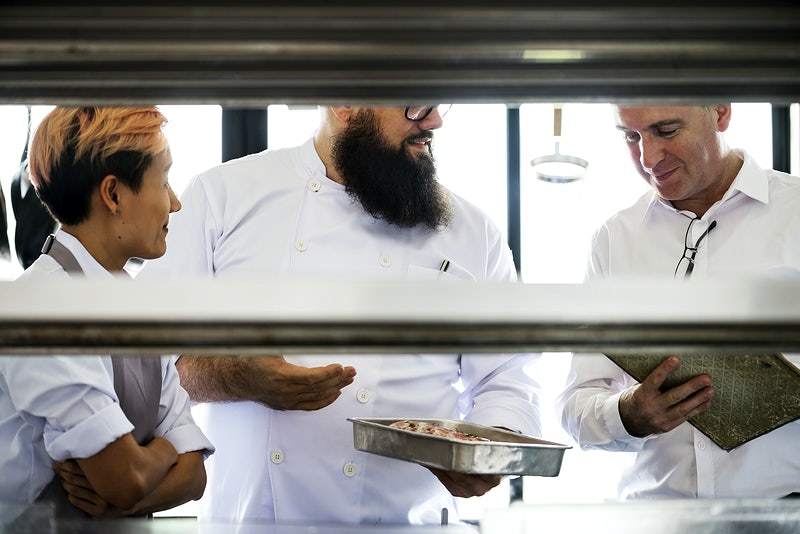How to Choose the Right Suppliers for Your Restaurant
Restaurants primarily rely on two factors to ensure their success: their customers and the quality of their food. However, the number of customers you get and whether they stay loyal to your business largely depends on your restaurant management. One aspect of management is finding the best suppliers.
Finding an exceptional restaurant supply store and having top-of-the-line restaurant inventory management is essential. This is because working with the wrong vendors and suppliers can be detrimental to your business’s wellbeing.
The relationship you have with your vendor is meant to be long term and growth oriented—so you must ensure that you carry out thorough research before settling for a supplier. Here’s what you need to know before deciding on which suppliers are right for your restaurant.
Make a List of Your Requirements

The most important step in deciding on which vendor to go for is knowing what you need from them. Before you have your restaurant’s big opening day—or perhaps when you are going through a revamp—you will need to list down what you need. From equipment, ingredients, dishware, table covers, to storage containers—list everything down.
You’re going to be working with a number of vendors, but the smart way to go is to try and get as much from one vendor as possible. For example, if you know that you need dishware and table covers, and there is a vendor that supplies high quality supplies of both—you might consider working with them rather than two separate vendors. This is lighter on your budget as well.
Learn about the most popular and reliable vendors in your area—and what they supply. There’s no question that you must include every minor requirement. When your restaurant is ready to open in full-swing and you’re missing even the slightest detail, it can throw your business off track.
Another aspect to list down is whether you need regular supplies or one-time investments. For example, for large equipment such as coolers and refrigerators, you should ideally work with a supplier who you can buy high-quality equipment that comes with warrantees and reliable policies.
On the other hand, if you need a regular supply of paper towels and food, etc., you’ll need to find a vendor that delivers these on a timely basis at regular intervals.
Check Their Quality
A thorough quality check is going to make or break your decision to settle for a certain supplier. You must discuss the grade and type of all the raw ingredients. Learn about where they obtain their ingredients from and how fresh they are when they are delivered to you. It’s best to get samples of all their supplies beforehand so that you know what you are signing up for.
Some dishes require different stages of the same raw material. For example, some of your dishes will need the ripest vegetables, while sometimes, you will need older vegetables. Make sure that your vendors supply all the kinds of ingredients you need.
If your focus on ingredients is that they should be coming directly from a farm—you need to get in touch with a local supplier. On the other hand, if you need condiments, your aim should be to work with the vendors who have the best customer service and don’t deliver damaged or expired products.
Another aspect of quality of a vendor is whether they are punctual and give thorough documentation of how many supplies they have provided you with on a weekly basis, along with the expenses of all. This ensures that you can check for any discrepancies and makes restaurant inventory management easier.
TIPS FOR CHOOSING THE RIGHT WHOLESALE FOOD SUPPLIER.

Decide on Your Budget
Now that you know what you need and how much, as well as the kind of quality you are aiming for—you need to decide how much you’re willing to spend. Remember that your vendors are the lifeline of your restaurant and you will be working for them throughout your business’s life—so you have to think about the overall cost that you will be incurring in the long run.
You may start off with a vendor that charges exorbitantly high prices and find it manageable initially—especially because it gives off a more impressive image to new customers. However, if your menu items and your overall earnings do not compensate for these expenses, you will eventually have to lower your budget.
Additionally, a goal with vendors is to develop friendly relationships that are built on trust and dependability. If you have to keep switching your vendors and are constantly renegotiating prices—it creates an environment of resentment. Make sure you know what you are signing up for when you decide on a vendor that charges a certain amount.
When deciding the budget, you will have to know how much you are planning on pricing your menu items. This makes it easier to determine whether you are earning enough on returns from each dish as compared to how much it cost to prepare it. This makes shortlisting your vendors less challenging.
Payment Options

Last but not least, check the payment options for different vendors. Do they allow financing, take returns, and have warrantees on their equipment? Do they allow for a credit period, which is usually necessary when you are just starting off with your business?
A credit period allows you to pay a vendor after you have made money from your sales and can be up to a month long, but you will have to check with the vendor beforehand. Additionally, you will want to settle for fixed rates for your food supplies.
Because many ingredients, especially raw materials, go through constant variations—to streamline your business, you should settle for monthly or quarterly rates. This is vital for getting an idea of your monthly expenditures and planning your budget, otherwise the changing rates will make it difficult to determine how much you are expecting to spend every month.
Final Words
Hopefully, you have a clearer idea of what you need to do before finalizing a vendor. To learn more about what kinds of supplies you will need, contact an experienced restaurant consultant. The more detailed your list is—the fewer the chances of you missing out on any essential supplies.
